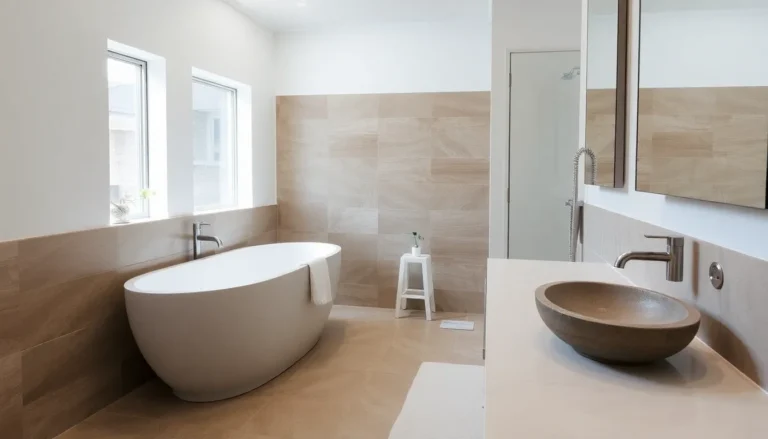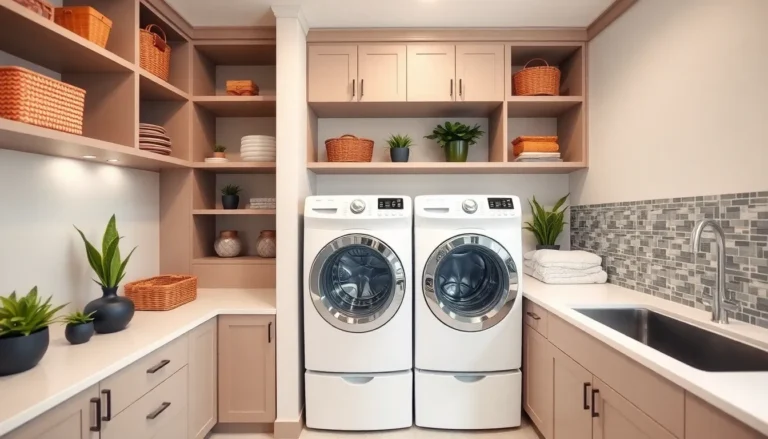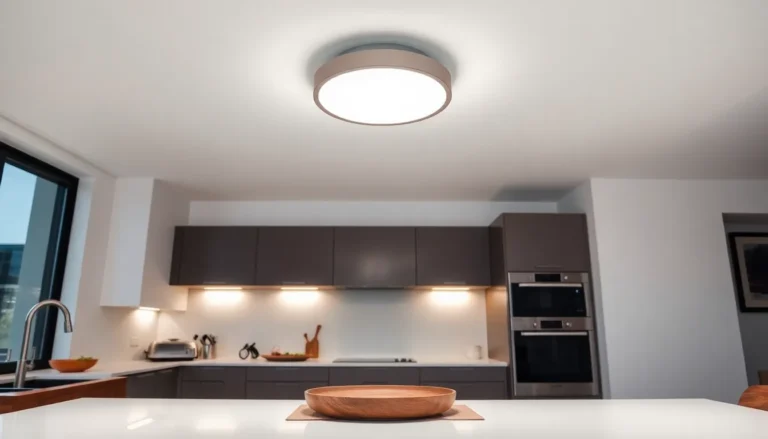Table of Contents
ToggleHome renovations can feel like a rollercoaster ride—exciting yet terrifying. Whether it’s a kitchen makeover that’ll make chefs weep or a bathroom upgrade that turns morning routines into spa experiences, funding those dreams can be a challenge. But don’t worry, he’s not about to suggest selling a kidney or starting a lemonade stand on the corner.
Understanding Home Renovation Funding
Home renovation funding options provide diverse paths for financing projects. Conventional loans offer one of the most recognized methods, characterized by their fixed interest rates and predictable repayment terms. Home equity lines of credit (HELOCs) allow homeowners to borrow against their home’s value, providing flexibility for accessing funds as needed.
FHA 203(k) loans cater specifically to renovation needs, enabling buyers to finance both the purchase and improvement costs into one loan. Personal loans serve as another alternative, offering unsecured funding options with varied terms and interest rates, suitable for smaller projects.
Cash-out refinancing involves replacing a current mortgage with a new one for a larger amount, enabling homeowners to access equity to fund renovations. Government grants and programs, often available for energy-efficient upgrades or low-income households, provide funds that do not require repayment.
Each option carries unique benefits and potential downsides. Assessing personal financial situations helps determine the most suitable choice. Consulting with a financial advisor or mortgage specialist ensures homeowners make informed decisions based on their circumstances.
Variables like interest rates, fees, and repayment schedules play crucial roles in choosing a funding method. It’s essential to compare various offers to secure the best deal. Careful evaluation of renovation goals and budget constraints streamlines the funding process, making the dream of home upgrades a reality.
Factors to Consider When Funding Renovations
Funding renovations requires careful thought, particularly regarding budget and financial health. Evaluate various factors to ensure a successful project.
Budgeting for Your Renovation
Establishing a clear budget takes priority in renovation planning. Consider costs for materials, labor, and unexpected expenses. Research average prices to create an accurate estimate. Itemize expenses into categories for better tracking. Setting a realistic budget might help avoid overspending. Engaging with contractors for quotes offers useful insights. Adjusting the budget as needed based on specific project requirements can lead to financial balance.
Assessing Your Financial Situation
Understanding existing finances plays a crucial role in funding decisions. Review personal income, savings, and debt levels to grasp available resources. Calculate monthly expenses to determine how much room exists for additional payments. Gathering financial documents strengthens applications for loans or lines of credit. Consulting with a financial advisor provides professional insights into options. Evaluating stability in income allows for better long-term financial commitments. Analyzing credit scores could affect eligibility for various financing methods.
Best Ways to Fund Home Renovations
Funding home renovations requires a mix of strategic choices that cater to individual financial situations. Various options exist, making it essential to explore them thoroughly.
Home Equity Loans and Lines of Credit
Home equity loans offer fixed amounts based on property value. These loans typically come with lower interest rates. Lines of credit provide flexibility by allowing homeowners to withdraw funds as needed, making them useful for larger projects with fluctuating costs. Borrowers should consider their home equity ratio and existing debt before accessing these options. Consulting with lenders for better terms and conditions enhances the borrowing experience.
Personal Loans and Financing Options
Personal loans serve as a quick financing source for smaller renovation projects. These loans generally offer fixed interest rates and straightforward repayment terms. Many financial institutions facilitate easy application processes and quick approval. Comparing rates from different lenders can yield better deals. Understanding the total repayment amount is crucial before selecting a personal loan.
Government Grants and Programs
Various government grants and programs provide financial assistance for specific renovation projects. Energy-efficient upgrades often qualify for funding through local or federal programs. Homeowners should research available grants in their area, as eligibility may vary. Agencies like the Department of Energy and local housing authorities often have resources to explore. Securing these funds contributes to reduced renovation costs.
Credit Cards and Cash-out Refinancing
Credit cards can finance minor purchases during renovations, providing quick access to funds. Interest rates vary significantly, emphasizing the importance of repayment plans. Cash-out refinancing enables homeowners to tap into their home equity for renovations while possibly securing lower interest rates on existing mortgages. Evaluating current mortgage rates helps determine the advantages of this option. Both methods require diligent budgeting to avoid accumulating debt.
Tips for a Successful Renovation Funding Strategy
Assess financial goals to ensure funding matches renovation plans. Prioritize establishing a realistic budget by including material costs, labor fees, and potential unexpected expenses. Engage contractors early for accurate quotes, which aids in precise budgeting and planning.
Review existing financial conditions, focusing on income, savings, and debt levels. Understanding these factors influences the choice of funding options. Analyze credit scores, as higher scores generally lead to better loan terms. Consulting with financial advisors strengthens applications for loans and credit lines, making it easier to secure necessary funds.
Consider flexible financing methods like home equity lines of credit (HELOCs) for larger projects. Explore personal loans for quick cash access on smaller renovations, comparing rates across multiple lenders to find the best deal. Investigate government grants aimed at energy-efficient upgrades, which can significantly reduce renovation costs.
Use credit cards wisely for minor purchases without overspending. Examine cash-out refinancing to effectively access home equity, offering more funds for desired improvements. Prioritizing a thorough review of financial strategies helps ensure a successful and manageable renovation process.
Finding the right funding for home renovations doesn’t have to be overwhelming. By exploring various options and assessing personal financial situations, homeowners can make informed decisions that align with their renovation goals. Whether it’s through home equity loans, personal loans, or government grants, each choice offers unique benefits.
Establishing a realistic budget and engaging with professionals early on can significantly enhance the renovation experience. With careful planning and strategic financing, homeowners can transform their spaces without falling into financial pitfalls. Ultimately, the right approach to funding can lead to successful and satisfying home improvements.






